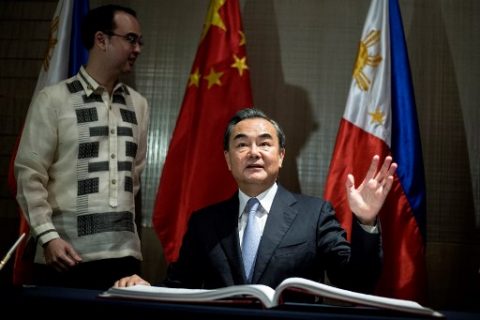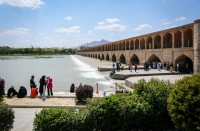
China urged Southeast Asian nations on July 25 to unite and “say no” to outside forces seeking to interfere in the South China Sea dispute — an apparent swipe at the United States ahead of a regional summit. China’s Foreign Minister Wang Yi made the statement during a two-day visit to Manila where he hailed the “strong momentum” in the improvement of bilateral ties under Philippine President Rodrigo Duterte. / AFP PHOTO / NOEL CELIS
Beijing urged Southeast Asian nations on Tuesday to unite and “say no” to outside forces seeking to interfere in the South China Sea dispute, in an apparent swipe at the United States ahead of a regional summit.
Chinese Foreign Minister Wang Yi made the statement in Manila where he hailed the “strong momentum” in improving ties with the Philippines, a longstanding American ally which has moved closer to China under President Rodrigo Duterte.
Wang’s visit came a week before he was set to return to Manila for a meeting of foreign ministers from the 10-member Association of Southeast Asian Nations (ASEAN) and its partners, which include China and the United States.
Wang said warming relations between Beijing and Manila had helped ensure stability in the South China Sea, where rival claims have long made it one of Asia’s potential military flashpoints.
“If there are still some non-regional forces or forces in the region that don’t want to see stability in the South China Sea and they still want to stir up trouble in the South China Sea, we need to stand together and say no to them together,” Wang told reporters.
US surveillance activities, a threat to China’s security, says China’s foreign ministry spokesman
Meanwhile, China’s foreign ministry spokesman Lu Kang also said frequent U.S. surveillance activities are not good for mutual trust and constitute a threat to China’s security, after Chinese fighter jets intercepted a U.S. Navy surveillance plane over the East China Sea.
“For a long period, U.S. military warships and jets have carried out long and very frequent close surveillance (operations) near China’s coast. This is not conducive to mutual trust between the Chinese and U.S. militaries, and constitutes a threat to China’s legitimate security. We hope the United States can cease this kind of surveillance activity,” he said.
U.S. officials, speaking on condition of anonymity, said initial reports showed one of the Chinese J-10 aircraft came within about 300 feet (91 meters) to the U.S. EP-3 plane on Sunday (July 23) to cause the American aircraft to change direction. One of the officials said the Chinese jet was armed and the interception happened 80 nautical miles (148 km) from the Chinese city of Qingdao.
Chinese Foreign Ministry spokesman Lu Kang made the comments during a regular news briefing in Beijing, and referred questions related to the flight to the “relevant department”, a reference to the defense ministry, which has yet to comment.
China claims nearly all of the strategically vital sea, even waters approaching the coasts of its neighbors.
ASEAN members the Philippines, Vietnam, Malaysia and Brunei, as well as Taiwan, claim parts of the sea.
While the United States is not a claimant and says it takes no sides in the disputes, it has criticized what it has termed Chinese “militarization” of the sea.
Washington has repeatedly sent warships close to Chinese-occupied islands in the sea in recent years, triggering angry responses from Beijing.
Duterte has loosened his nation’s 70-year-old alliance with the United States while looking to build stronger relations with China and Russia.
He has said better relations with China, following six years of tension under his predecessor who took a hard line with Beijing over the dispute, will generate billions of dollars in promised Chinese investments and aid.
Duterte said on Monday the Philippines and China were in talks for joint exploration in the sea, which is believed to sit atop vast oil and gas deposits.
Wang on Tuesday pledged 20 million renminbi ($3 million) to help rehabilitate the war-torn southern Philippine city of Marawi, where a US-backed military offensive is seeking to flush out pro-Islamic State group militants.
(Agence France Presse with a report from Reuters)







